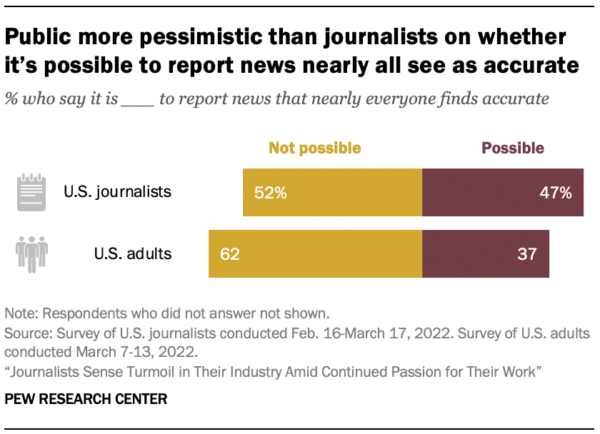Privately owned US media outlets have leaned increasingly toward their business side and profitability. Corporate media has seemingly strayed from the objective of providing the general public with unbiased information on the world around them, rather they prioritize profits. There are various implications to the shift toward such a standpoint in media: a loss of journalistic integrity to corporate values, little to no consumption of unbiased information, and media output shifted toward targeting certain audiences.
The issue is that most outlets that reach mass audiences are for-profit, and, according to FAIR, they are obliged to “put the profits of their investors ahead of all other considerations.” Due to this private ownership, it becomes difficult for readers and consumers of media to access objective information. The “media landscape” that has resulted from the developing presence of private outlets includes a worrying distance from neutrality. For voters this poses a unique danger; the media is a source of confirmation bias. Voters in the US are already highly antipathetic to members of the opposing party, and the country faces record polarization. However, consuming what they believe to be legitimate media confirms only their own beliefs in addition to this social isolation in interpersonal antipathy.

Citizens are paying the price for all of corporate media’s profit. These kinds of outlets are diminishing voters’ capacity to make objective choices, and enhance polarization. Albert Einstein wrote that resulting from such a dynamic, it is “in most cases quite impossible for the individual citizen to come to objective conclusions and to make intelligent use of his political rights,” such as their vote.
When the media is supposed to offer a channel for objectivity and foster critical thought in readers, it is a particular threat for it to be doing the opposite. Corporate media outlets pose as reliable sources while publishing biases or news that will gain “popularity”. Current media outlets often take advantage of shorter attention spans and warp information in their headlines to make audiences more likely to consume their output.
The danger that private media poses is not limited to its audience, however. Journalists are forced to compromise their honesty in exchange for job stability. Privatization of journalism has led many to lose their journalistic integrity in the process of starting their careers. Many journalists do not have access to independent journalism companies such as the New York Times or the BBC when first entering the workforce. Most begin by working at private companies before, if ever, moving toward such independent journalistic entities.
In a study conducted by Pew Research, they found that 82% of journalists agree on “keeping their own views out of their reporting,” but still, “there is far less consensus over whether journalists [are] meet[ing] this standard.” And, 52% of journalists believe it is not possible to publish information “everyone finds accurate.” This can be accredited to the large portion of the journalism field that is privately owned in the US. For example, Gannett Co., Inc. owns 250 dailies across the US.

For-profit outlets are the first to cut costs in order to maximize profits. A discrepancy to this is that research, investigation, and serious reporting are expensive to engage and succeed in. Private media outlets may resultingly overlook the importance of the quality of inputs to a journalist’s work. Independent outlets’ main focus is unbiased flow of information from the journalist to the public, allowing for a flourishing relationship between the outlet and the audience. It is a relationship of trust from the consumer to the journalist. Parallel to the development of private media outlets, the level of public trust in media has declined.
Another study done by Pew Research showed that Republican partisans’ trust in national media outlets dropped from 70% in 2016 to 35% in 2021, and among Democrats from 83% to 78%. There is a consensus across the American public that national media deliberately misleads their audiences. According to Fortune, a survey conducted by the Knight Foundation established that half of Americans “believe national news organizations intend to mislead, misinform or persuade the public to adopt a particular point of view through their reporting.”
Hopes are not high and evident solutions aren’t very achievable. A good option would be to adopt a national broadcasting system such as the ones France, Germany, and other countries have. However, establishing public broadcasting takes certain social conditions – such as political unity – that the US public does not seem to meet. It is difficult to backtrack on a drastic distrust of the media, which makes the situation all the more worrisome.
Featured image: Unsplash







